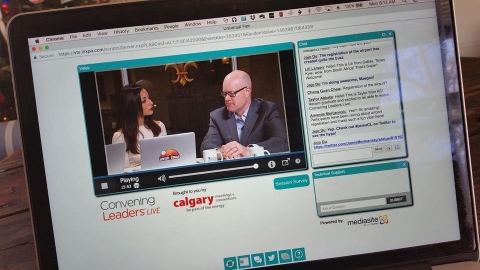How to Do a Digital Event the RIGHT Way! PCMA Knocks It Out of the Park

For the second year in a row and much to my chagrin, I was unable to attend the Professional Convention Management Association’s Convening Leaders annual meeting.
This year, it was held in the great city of Austin, Texas, and had three days packed with education and networking events.
Of course, I had serious FOMO (fear of missing out) – but lucky for me, PCMA holds an online digital event powered by INXPO that streams throughout their live event.
In my humble opinion, it is bar none the best digital event out there that coincides with a live event.
Here are just a few of the reasons why PCMA’s digital event not only works, but also works well. In fact, 1,700 people agreed and joined me online from all over the globe.
Content is King: Every day, there were several education sessions to choose from, including the keynotes. I had the great pleasure and surprise (along with the rest of the PCMA online and live audience) to gasp in utter shocked delight when actor Matthew McConnaughey bounded onto stage to kick things off.
He was just the beginning of many highlights. Keynotes included Rachel Botsman, a speaker and author, who talked about “Collaboration and the Meaning of Trust in the Digital Age”. There also was a plethora of sessions to choose from. I watched several, and one of the ones that I really liked was “Trade Show Rapid Fire: Reniventing Your Trade Show Strategy.” The session was led by Society of Independent Show Organizers’ Executive Director David Audrain, along with several show organizers who talked about how they executed major changes on their shows.
To say the least, there were a lot of sessions all three days that were available to the online audience. In three, short days, PCMA offered 18 difference education sessions, 8 interview sessions and 2.5 hours of technology demos.
Feeling Included: PCMA’s digital team does a great job of ensuring those who are taking part online are included on what’s going on live. The speakers always acknowledge the online audience and questions are taken from the online audience in the same way they are from the live audience.
If they are doing something in the room, like a quick get up and jump around moment to get the blood flowing, the online moderators encourage everyone to take part.
I felt like even though I was not there, I was acknowledged as being a part of the event.
Creating Community: PCMA’s digital team also did a really awesome job creating a community amongst the people taking part online. I recognized a lot of people from last year and the moderators facilitated a lot of conversations in the ‘chat’ area. They also were very quick to answer questions and provide information for speaker bios, content, etc.
In the mornings, there also were hosted coffee hours, and in the afternoons, there were virtual happy hours too. They both were a lot of fun and I met a lot of great people.
Having a Plan B and Plan C: Just like any live event, things online can go wrong as well. On Tuesday, there were issues with the broadcast during Jeremy Rifkin’s keynote.
Fortunately, PCMA’s digital team had a plan B. They also were streaming it Live on FB. Although the chat capabilities were not as nimble as their regular online platform, at least everyone could still watch it.
Plan C was the very next day they sent everyone who missed out on the live broadcast a link to watch the replay on demand.
Professional Interviews: Every day there also were live interviews that typically were with people who were going to be leading a session and they talked about a snippet of it beforehand. The interviews were extremely well done, expertly paced and handled. I really enjoyed being introduced to a lot of people and concepts in the event space that I didn’t know about before. The interviews all were about 5 minutes long and breezed from one to the next very seamlessly. Well done Sarah Soliman and Amanda Marijanovic. Well done.
The reality is, everyone’s not going to be able to make it to your live event, so why not give them the opportunity to still take part in a truly engaging way?
As PCMA has found out over the past few years of offering the digital component of their annual event, it has not only introduced new people to PCMA, but also attendees of the online experience have had so much FOMO seeing what was going on live, that they often converted pretty quickly to ‘live’ attendees in following years.
If you are interested in how your organization could add a digital component to your live event, PCMA's Digital Experience Institute offers certification on becoming a Digital Event Strategist.
For more info visit: http://
Also, look out on Feb. 1 for a rebroadcast of a few of the PCMA Convening Leaders live sessions.
You also can visit CNTV's coverage of the live event to see what you missed or revisit the good times! http://www.pcma.org/news/


Add new comment